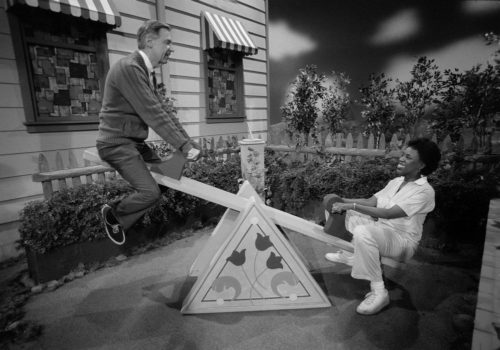
My childhood memories involving Mr. Rogers were probably pretty average for kids my age; he was the nice storyteller that my parents trusted enough to give full control over our afternoon TV; his show always moving at a infuriatingly slow walking pace, with enriching guests like Yo-Yo Ma and other musicians showing up to uphold virtuous habits and innocent ways of looking at the world that the rest of the shadowy empire of children’s television was ruining so thoroughly.
 Do I sound cynical? While Mr. Rogers has always been held relatively dear in my mind, he wasn’t exactly the most exciting personality on TV. I watched his shows with extreme curiosity and a healthy dose of suspicion; they seemed so different from anything else, with a combination of puppets and life-sized actors, strange voices, and a haze of make-believe which always seemed somewhat reined-in, so distant from the epic adventures and fantastical television effects on other shows. This isn’t to take away from the wonderful impact that Fred Rogers had on children across the country while his show ran (1968-2001), but here’s the truth: to this day, I have never known exactly what to do with this clumsy, supposedly-angelic, conservative-valued man on national television who made us watch him change his shoes (boring!) and play with shabby puppets.
Do I sound cynical? While Mr. Rogers has always been held relatively dear in my mind, he wasn’t exactly the most exciting personality on TV. I watched his shows with extreme curiosity and a healthy dose of suspicion; they seemed so different from anything else, with a combination of puppets and life-sized actors, strange voices, and a haze of make-believe which always seemed somewhat reined-in, so distant from the epic adventures and fantastical television effects on other shows. This isn’t to take away from the wonderful impact that Fred Rogers had on children across the country while his show ran (1968-2001), but here’s the truth: to this day, I have never known exactly what to do with this clumsy, supposedly-angelic, conservative-valued man on national television who made us watch him change his shoes (boring!) and play with shabby puppets.
Won’t You Be My Neighbor endeavors to show more behind Fred Rogers’ instantly likeable on-screen personality, but without the temptation to give its audience the ‘reveal’ we so often want; that there was a double-life, a secret he never told. And as a self-identified semi-skeptic of Mr. Rogers, this is something that I expected, perhaps subconsciously (which proves what television has become to our generation and to myself).
What the documentary shows is that to understand Mr. Rogers, we need to see his beginnings in television; that the show was an intentional inversion of the hype that television has felt necessary to produce endlessly in an effort to keep its viewers fixated. Compared with the extra-colorful, raucous fun of other kids’ shows, Mr. Roger’s Neighborhood feels like a visit into an alien world where everything moves in slow motion. Likewise, when we move in the other direction, from walking-paced stories of King Friday and his kingdom of puppets into candy-colored explosions from old Transformers reruns, we see the nihilism in the senseless images and noise that Mr. Rogers saw emerging in his own industry.
 In the documentary, Fred Rogers’ wife Joanne shares that, in the childhood homes of herself and her husband, anger wasn’t an emotion that could be publicly displayed. This parallels strangely with the documentary’s conclusion that Fred really was the man he appeared to be onscreen: always polished, patient, relaxed. Rather than depict his character as incapable of strong feelings or imperfection, however, the film helps the audience to understand Roger’s character through his own puppets: how he expressed himself through his puppets, sometimes using characters’ voices to communicate in his personal life.
In the documentary, Fred Rogers’ wife Joanne shares that, in the childhood homes of herself and her husband, anger wasn’t an emotion that could be publicly displayed. This parallels strangely with the documentary’s conclusion that Fred really was the man he appeared to be onscreen: always polished, patient, relaxed. Rather than depict his character as incapable of strong feelings or imperfection, however, the film helps the audience to understand Roger’s character through his own puppets: how he expressed himself through his puppets, sometimes using characters’ voices to communicate in his personal life.
Mr. Rogers’ work in television holds many parallels to what we see today in media, and Won’t You Be My Neighbor makes this very clear. Beyond this, however, it opens up the character of a man who to some (like myself) didn’t entirely make sense; someone who was innocent, happy, and seemingly out-of-touch with the modern rhythm of television. The documentary does not reveal a hidden truth about Fred Rogers which ‘completes’ his personality; it doesn’t confirm any of the rumors that critics wondered about during his career. Instead, it makes a case that he was exactly as he appeared to be, and I realize my own desire to make out his personality for myself; to decide for myself whether he was someone I liked or didn’t like.
 This comes from a predisposition to judge whatever I can get my hands on, and from reading and watching content which teaches me to be suspicious and to look for the big reveal. This is a message that comes at us from all directions: look, investigate, and judge. Without our desire to determine someone’s goodness or lack thereof, we wouldn’t need tabloids; we might not even need so many ‘true-crime’ documentaries.
This comes from a predisposition to judge whatever I can get my hands on, and from reading and watching content which teaches me to be suspicious and to look for the big reveal. This is a message that comes at us from all directions: look, investigate, and judge. Without our desire to determine someone’s goodness or lack thereof, we wouldn’t need tabloids; we might not even need so many ‘true-crime’ documentaries.
This documentary left me looking at the ways that I love the very kind of television that Fred Rogers worked against: the sensationalism of drama, or corruption, or the ‘true-nature’ lack of innocence that we are taught is the basis of human character. If I am to trust Mr. Rogers, I have to suspend my judgment and enter a world where goodness can be possible; the very kind of world that he sought to create for children around the country. While I cannot know ‘who Fred Rogers really was,’ I can see that the only way to truly appreciate his work and person, or anybody’s, is to forcibly leave my suspicions at the door; to hang them up on a coat hanger, so to speak, and to grant whoever is before me the trust and appreciation of who they really are.

COMMENTS
5 responses to “Getting to Know Fred”
Leave a Reply













Sadly, I always found him a bit creepy and almost always a bit moralistic and preachy.
Josepha, I’ve had a suspicion about this, too. But I do wonder how often, as you describe so well, my own suspicions are defensive mechanisms for some message the real “inner child” is so in need of hearing but also so defensive against. That, in truth, is the way I am about grace, period.
‘Think critically’ has become ‘approve or disapprove, and then project your opinion!
The great insight and message that I got from the movie was focused on Roger’s very accurate take at the beginning of his mission: that humiliation was the ingredient most obvious in the “humor” of other TV shows. The backward look into the days of kid’s shows makes it obvious that what was degrading to the victims of the pie-in-the-face was the beginning of a terrible downward slide into the demoralizing racket of contemporary “entertainment.” Of course, that is all part of our insatiable need to be “entertained.” The ancient maxim was that the purpose of drama was “to teach and delight.” I gathered from the movie that Fred Rogers was aiming at the best he could do for both sides of the equation. The end of the journey, when the poor redneck haters of other-than-myself, showed up to vilify him at the funeral home because of his supposed homosexuality, was chilling. It was a reminder to me of how far we have slid down the path that Mr. Rogers was trying to keep the children from. I hope your further considerations of the questions you raise continue to find enlightenment. Thanks for the attention you have begun to pay to this important documentary.